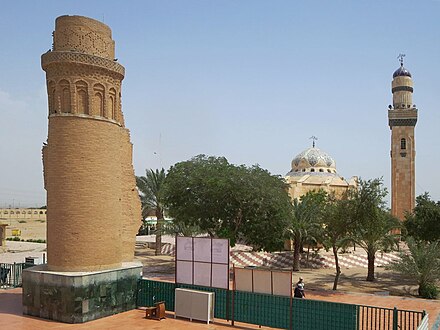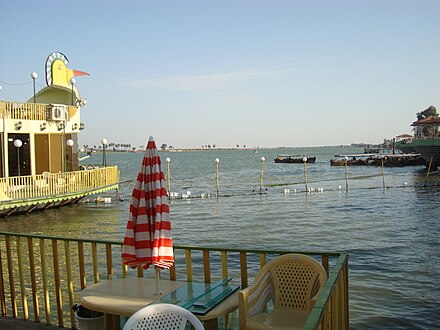Basra - capital of Basra Governorate, in southern Iraq
Many governments advise against all travel to Iraq. See the warning on the Iraq article.
Basra (Arabic: البصرة Al Baṣrah) is a port city in Southern Iraq, close to the border with Kuwait and Iran. It is Iraq's third largest city with a population of 2,150,000 (2017).
Understand


Situated along the Shatt al-Arab river, formed by the confluence of the Euphrates and the Tigris, the city's many canals and creeks once gave rise to the epithet Venice of the East. The fields along the river has is very fertile with agriculture being a major source of income for the region, the city's surroundings was particularity known for having the world's largest forest of date palms. Basra is a majority Shia Islam city, with small minorities of Christians, Assyrians and pre-Islamic Mandaeans. In addition to the Arabs, there is also a community of Afro-Iraqi peoples, known as Zanj. The Zanj are an African Muslim ethnic group, a mix of African peoples taken from the coast of the area of modern-day Kenya as slaves during the Medieval period.
Founded at the beginning of the Islamic era in 636, Basra became a flourishing commercial and cultural center from around 1200 AD and has remained so onwards. Basra was under the protection of the Portuguese empire from 1523 until captured by the Ottomans in 1668 which it remained part of until the end of First World War.
The last few decades have, however, been rough for Basra as it was the closest major city to the front lines of the Iran-Iraq War during the 1980s, with parts of the city destroyed by artillery fire. A few years later a rebellion against the dictatorship of Saddam Hussein was brutally crushed. While the city has largely physically recovered from these events, much of its cultural heritage has been lost. Basra is also on the front lines of climate change with summer temperatures nearing unbearable extremes. Desertification and salinization of the rivers is causing major issues. Combined with decades of neglect and social unrest, Basra is generally off-limits for tourists. Most foreigners finding themselves in the city are here because of nearby oil and natural gas facilities. However, there are still speckles of former glory left for the intrepid traveller to explore.
Climate
See also: Hot weather
Basra is among the hottest cities on Earth, with temperatures exceeding during July and August. While the air has a relatively low humidity, extreme temperatures can easily lead to dehydration and fatigue. Temperatures during the rest of the year are more pleasant, during winter months daily highs are around while temperatures during spring and late fall hovers around .
Get in
Basra is close to Kuwait. The Safwan border crossing is a safe exit point into Kuwait from Iraq, but it is highly inadvisable for foreigners to enter Iraq from Kuwait. The Iraqi immigration entry point is watched by insurgents and there is a small chance that they will try to kidnap Western-looking individuals on the road once they have crossed into Iraq. Entry from Iran is also very unsafe and is not advised.
By plane
There are daily international connections from Dubai, Istanbul, Beirut and Amman and a weekly flight from Beijing. Domestic flights are available from Erbil and Baghdad.
- Basra International Airport (مطار البصرة الدولي), 30.5527°, 47.6685°. IATA: BSR 2022-04-16
By road
The main road between Baghdad and Basra is Freeway 1, which is generally in good condition.
By train
There are two overnight trains from Baghdad every day, a slower one taking 12 hours and one express train with a journey time of 6-7 hours. However, delays are quite common. Both trains carry a restaurant car and have both seats and couchettes. There are also occasional trains from the holy city of Karbala, operated mainly around religious festivals.
Nearby Khorramshahr, the closest city across the border in Iran, has daily overnight trains from Tehran.
- Basra Al Maqal railway station (محطة قطارات المعقل), 30.5597°, 47.7847°. 2021-06-26
By boat
A river ferry is available from nearby Khorramshahr, across the border in Iran, taking just 45 minutes to complete the journey. The ferry is run by Valfajar Shipping Company (dead link: January 2023) and there are multiple sailings each week.
Get around
A public transport system is available, but it's chaotic and provides little to no information in English. Walking is difficult as there are few footpaths. Taxis and ride-hailing services are however both plentiful and cheap and is generally the best way of travelling longer distances within the city.
See

This list also features some sites located in nearby the nearby city of Az Zubayr.
- Basra Museum, 30.4974°, 47.8611°. 09:00-15:00. Opened in September 2016 in the former Lakeside Palace of Saddam Hussein. Iraqi citizens US$1, foreign visitors $10 2018-08-01
- Badr Shakir al-Sayyab statue, 30.52213°, 47.84153°. Basra was the home of one of the Arab world's most celebrated poets, Badr Shakir al-Sayyab (1926-1964). This statue of him stands at the corniche. 2018-08-01
- Badr Shakir al-Sayyab Home. Birthplace of Badr Shakir al-Sayyab, now a cultural center. 2021-06-26
- Sinbad Island, 30.57595°, 47.77719°. A tourist landmark, named after Sinbad the Sailor, who embarked on his legendary journeys from Basra. Decades ago, this island was known for its parks and nightlife. Perhaps it still is! 2017-12-26
- Corniche al-Basra, 30.52235°, 47.84026°. A street which runs on the shore of the Shatt al-Arab, from the Lion of Babylon square to the four palaces. 2017-12-27
- Basra Memorial, 30.4113°, 47.5460°. A Commonwealth War Graves Commission war memorial. The memorial commemorates 40,682 Commonwealth forces members, of which 99% were Indians, who died during the Mesopotamian Campaign of World War I. 2020-08-03
- Church of the Virgin Mary (كنيسة مريم العذراء), 30.500052°, 47.814332°. Inaugurated in 1930 and restored in 2019, this is the largest Chaldean Catholic in Basra. 2020-08-30
- Saint Thomas Chaldean Church, 30.5012°, 47.8133°. 2021-06-26
- Sacred Heart Church, 30.5184°, 47.8370°. Syriac Catholic church. 2022-05-12
Mosques
- Imam Ali Mosque (جامع خطوة الإمام علي), 30.399565°, 47.733162°. Founded in 635, this is one of the oldest mosque in the history of Islam. Parts of the original structure still remains. It's often simply referred to as the old mosque of Basra. 2020-03-01
- Sayyed Ali al-Musawi Mosque (Al-Basrah great Mosque), 30.50380°, 47.82823°. This mosque was built for Shia Imami's leader Sayyed Ali al-Moussawi in Iraq and neighboring countries. 2017-12-26
- Great Mosque of Basra, 30.500745°, 47.816426°. Largest mosque in Basra. 2021-05-01
- Mausoleum of Imam al-Hasan of Basra (مرقد الإمام الحسن البصري). Built in 1185, the mausoleum is dedicated to Ḥasan of Basra, an early Muslim theologian. 2021-05-01
- Anas Ibn Malik shrine. Historic shrine believed to be the burial site of Anas ibn Malik, an well-known early discipline of Islam. 2021-06-26
- Husayn ibn Ali Mosque (مزار عبد الله بن علي الهادي), Istiklal St, 30.5173°, 47.8368°. Ottoman-era Shia mosque. Located next to the 2022-05-12
- Al-Maqam Mosque (جامعة المقام). Built by the Ottomans in 1754. 2022-05-15
Old Basra
Only a few blocks remain of the old Basra, once described as the Venice of the East with colonial and Ottoman mansions lining the city's canals. Many houses feature the iconic shanasheel balconies, built in wood to protect interior of houses from the heat of the day as well as providing an overlook onto the street. A UNESCO-funded project took of in 2018, aiming at restoring some of the derelict houses in the old quarters.
- Basra Heritage Museum, 30.501874°, 47.816706°. A small heritage museum, housed in an historic building that used to be the Greek consulate during Ottoman times. 2020-08-30
Do
- Basra Sports City (مدينة البصرة الرياضية), 30.4416°, 47.7828°. A major sports complex that opened in 2013. 2022-07-27
- River cruise, 30.5165°, 47.8458°. There are boats that will take you for a short cruise along the Shatt al-Arab. 2017-08-22
- Basrah Land (formerly Basrah Fun City), 30.5230°, 47.8400°. One of the oldest theme parks in southern Iraq, and the largest, involving a large number of games giants. 2021-03-02
Buy
- Indian market (Al-magaeiz). One of the main bazaars in the city. 2017-12-27
- Hanna-Sheikh bazaar. An old market which was established by the powerful and famous Hanna-Sheikh family. 2017-12-27
- Shanshal Mall, Al-Gazar Street, +964 770 577 7771. 2020-06-21
- Basra Times Square, Dinar St, +964 771 330 3338. Daily 10:00-00:00. Indoor mall 2020-06-21
Eat
Most restaurants are located along the corniche, many with excellent views over the river.
- Shatt Al Arab Restaurant (مطعم وملتقى شط العرب السياحي), 30.509653°, 47.850664°. Large and popular restaurant with traditional Iraqi foods along the river. 2020-09-16
Drink
Sleep
- Basra International Hotel (فندق شيراتون البصرة), 30.51790°, 47.84348°, +964-781-5555472, info@basrainternationalhotel.com. One of few high-end hotels in town, has a swimming pool, tennis court and five restaurants. Service, however, is not on par with the quite hefty price. Prices from US$475 per night 2019-02-24
- Shams Al Basra (شمس البصرة), Al-Watan Street, 30.516280°, 47.841659°, +964 781 116 5777. 2016-07-09
- Mnawi Basha Hotel (Menawi Basha Hotel), 30.5062°, 47.8420°. One of the big hotels in Basra. It implies it is a 5-star, but does not make 4-star on any normal scale. It is secure, food is edible, rooms reasonable and there is acceptable Wi-Fi. There are also ATMs. 2019-02-24
- Basrah International Airport Hotel, 30.5569°, 47.6705°, +964 782 720 6970. Business-oriented hotel, located next to the airport. 2022-04-16
Stay safe
Tap water is not safe to drink, with many people getting sick due to drinking contaminated water.
Go next
Basra
basra.gov.iqBasrah District
2nd-order administrative division
Basra
Primary administrative division

